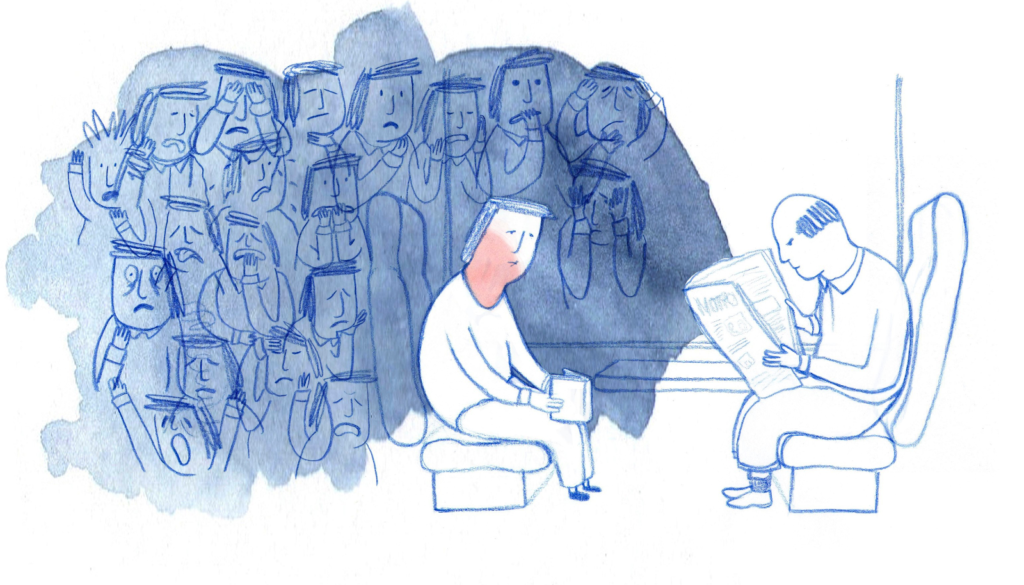A Guide to Making Friends for the Socially Anxious
Ever since I can remember, I’ve been an introvert. I have always preferred keeping to myself and my books. I thought that the need for socialization just skipped me and I willingly isolated myself. Over the years, simple tasks that involved socialization like making phone calls or ordering a coffee in person seemed like insurmountable challenges. I became deeply afraid of saying the wrong thing, and I started opting to saying nothing at all. I started to avoid any social situations. And when I did attend, I often found myself upset with my inability to express myself.
I felt like I couldn’t let myself be, despite the desperate want to. I knew that this wasn’t normal, but like most people discussing “social anxiety,” I never considered that it was an actual problem. But, it is. About seven percent of adults in the past year have reported cases of social anxiety disorder. It’s apparent that this issue is expanding beyond shyness into a disruptive and unsettling aspect of some people’s everyday lives. I’m one of those people.
Identifying my social anxiety as a problem has changed the way I approach socialization as a whole. I’ve progressed so much further than I could’ve ever dreamed of. Don’t get me wrong, I’m not perfect. I still have times where I refuse to pick up a coffee out of fear of speaking to the barista. But, I’ve definitely pushed myself out of my comfort zone in so many ways and made some beautiful memories in the process. If you’re like me, know that you aren’t alone. Hopefully, these tips can help you process in your journey as I have in mine.
What Didn't Work
Before getting into what worked for me, I want to go through a couple of things you should stay away from. Just as a reminder, you aren’t alone. There is no shame in asking for help if you need it. We’re all in this together.
I think what helped me out a lot is abandoning any idea of a big, grand and ![]() quick recovery. There is no way that you can suddenly start to overload your schedule with social events to get you out of your shell. You’re only going to exhaust yourself. But on that same token, it isn’t the best idea to only do something social “from time to time.” If you’re deciding that your social life is going to be a priority, make it a priority. It’s okay if you mess up. If you started, you should celebrate.
quick recovery. There is no way that you can suddenly start to overload your schedule with social events to get you out of your shell. You’re only going to exhaust yourself. But on that same token, it isn’t the best idea to only do something social “from time to time.” If you’re deciding that your social life is going to be a priority, make it a priority. It’s okay if you mess up. If you started, you should celebrate.
Progressing with your social anxiety–as with anything–is all about patience and consistency. If you continue to put one foot in front of the other, you’re going to get where you want to go. You just have to start.
What Worked
There are two main aspects that every social anxiety recovery plan should include: confidence and coping. Every social situation is different. Likewise, every person you will encounter is different. Your recovery journey shouldn’t be centered around creating a set of cue cards to suit those differences, but rather in building confidence in your ability to perform regardless of unpredictability. In cases of adverse situations, your recovery arsenal should incorporate a constructive coping mechanism. Not every conversation is going to go well, and you need to be prepared for it. Otherwise, the following are some tips that helped me out a lot:
1. Treat Yourself as You Would a Stranger
Getting to know yourself is imperative to recovery. How can you begin to place yourself in unknown situations if you don’t know yourself? You need to make it your mission to get to know as much about yourself as possible. I suggest starting with a blank slate: treat yourself as you would treat a stranger. Start with the basics like your favorite color and food and then, as time passes, expand to interests, hobbies, passions, etc. Then, get existential. What makes you happy? What makes you feel comfortable? What makes you upset?
You should have fun with this! Whether you get into astrology and begin to live by your Co-star notifications or you take personality test after test, getting to know yourself will help you identify where and how you thrive. Here are some tests I used and strongly recommend:
![]()
2. The Art of Thinking Small
Setting smaller goals helps you feel more accomplished, thus enabling you to do bigger and better. For instance, let’s say that you get invited to go to a friend’s birthday party. Instead of making a goal to approach someone you don’t know, set a goal of simply attending. If you get there and feel uncomfortable, don’t push yourself any further. Instead, begin applying a constructive coping technique. Make your goal to stay at the party. When it’s over, celebrate that you went.
But if you do feel comfortable, make a goal to talk to someone you know. If that goes well, talk to someone else. Making and feeling out smaller steps instead of rushing to bigger things will make socializing feel a bit easier.
3. Use "Your Spots"
![]() Public spaces you already go to are great places to practice your social skills. If you go to a certain coffee shop, ask the barista about their day. If you go to the library, ask the librarian for a book recommendation. You don’t have to start with extremes. Use what you have!
Public spaces you already go to are great places to practice your social skills. If you go to a certain coffee shop, ask the barista about their day. If you go to the library, ask the librarian for a book recommendation. You don’t have to start with extremes. Use what you have!
4. Let Your Interests Lead the Way
Realizing what you love—or what you love to talk about—will help you figure out where you can socially monopolize. For example, if you love books, go a book club meeting. Everyone attending has a similar interest, and in turn, will be expecting to converse about it. Go to places where you’ll have a chance to talk about something that makes you comfortable.
If you’re a college student, joining student organizations aligning with your interests is a great way to branch out!
5. Working the Room from the Outside-In
This is mainly a tip for parties or big social events. Again, I urge you to think smaller. Instead of joining a group conversation with a lot of people, try to remain on the outskirts and talk to one or two people at a time. Make it your goal to stay at this event. Find someone you know or kind-of know and simply ask how their day is going.
6. Treat Everyone as if They're Famous
If you’re in a conversation with someone you don’t know, make the conversation about them. Everyone likes to feel important, so asking someone questions about themselves conveys that you have an interest in who they are. But, don’t forget to add something here and there about yourself. If you share something in common, mention it! If what they said reminded you of something, tell them what it is. There is no shame in letting people get to know you as you get to know them.
It's Time to Get Started
I hope these tips are helpful to your journey with social anxiety. Feel free to let me know how they worked for you by reaching out to me on Twitter. Best of luck!





